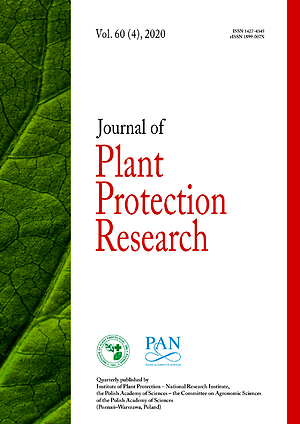RAPID COMMUNICATION
The molecular identification and phylogeny of moths feeding on cereals, belonging to Cnephasia species based on cytochrome c oxidase subunit I gene
1
Department of Molecular Biology and Biotechnology, Institute of Plant Protection – National Research Institute, Poznań, Poland
2
Department of Monitoring and Signalling of Agrophages, Institute of Plant Protection – National Research Institute, Poznań, Poland
A - Research concept and design; B - Collection and/or assembly of data; C - Data analysis and interpretation; D - Writing the article; E - Critical revision of the article; F - Final approval of article
Submission date: 2020-06-16
Acceptance date: 2020-08-10
Online publication date: 2020-11-10
Corresponding author
Marta Budziszewska
Department of Molecular Biology and Biotechnology, Institute of Plant Protection – National Research Institute, W. Wegorka 20,, 60-318, Poznan, Poland
Department of Molecular Biology and Biotechnology, Institute of Plant Protection – National Research Institute, W. Wegorka 20,, 60-318, Poznan, Poland
Journal of Plant Protection Research 2020;60(4):410-414
KEYWORDS
TOPICS
ABSTRACT
The genus Cnephasia is represented by more than 70 species of insects worldwide, including
serious pests of agricultural plants, mainly cereals. Since members of this genus are
frequently very similar externally, species determination based on morphotaxonomy is
time-consuming and difficult, especially for non-taxonomists. Hence, it could possibly be
replaced by molecular biology approaches. A short nucleotide sequence of mitochondrial
cytochrome oxidase I (mtCOI) constitutes a commonly used molecular marker for phylogenetic
analyses identification. The aim of this work was molecular species determination
of leaf rollers, collected in Poland, that on the basis of external features were hardly
distinguishable. We amplified, sequenced and phylogenetically studied the fragment of the
mtCOI gene for each individual. Comparative analyses showed the highest nucleotide similarity
to C. genitalana, C. longana, C. pasiuana, C. asseclana and C. stephensiana, which
was also confirmed by phylogeny. Obtained results showed genetic variation of the analyzed
fragment of the mtCOI gene between analyzed Cnephasia spp. found in Poland that
can be helpful in proper species determination. This in turn, may be essential for successful
biological control and pest monitoring in crop cultivation.
ACKNOWLEDGEMENTS
We wish to thank Dr. A. Obrępalska-Stęplowska from
IPP-INR for her valuable help and suggestions during
the preparation of the manuscript.
FUNDING
This work was supported by the Polish Ministry
of Science and Higher Education, statutory activity
project: BIOTECH1.
CONFLICT OF INTEREST
The authors have declared that no conflict of interests exist.
REFERENCES (13)
1.
Akhilesh V.P., Sebastian C.D. 2016. Cytochrome oxidase subunit I gene based phylogenetic description of common mormon butterfly Papilio polytes (Lepidoptera: Papilionidae). International Journal of Science and Research 5 (3): 977–980.
2.
Dinsdale A., Cook L., Riginos C., Buckley Y.M., De Barro P. 2010. Refined global analysis of Bemisia tabaci (Hemiptera: Sternorrhyncha: Aleyrodoidea: Aleyrodidae) mitochondrial cytochrome oxidase 1 to identify species level genetic boundaries. Annals of the Entomological Society of America 103 (2): 196–208. DOI: https://doi.org/10.1603/AN0906....
3.
Ghosh A., Abedin M.S., Howlader A.J., Hossain M.M. 2019. Molecular identification and phylogenetic relationships of seven Satyrinae butterflies in Bangladesh using cytochrome c oxidase subunit I gene. Jahangirnagar University Journal of Biological Sciences 8 (1): 67–74. DOI: https://doi.org/10.3329/jujbs.....
4.
Hajibabaei M., Janzen D.H., Burns J.M., Hallwachs W., Hebert P.D. 2006. DNA barcodes distinguish species of tropical Lepidoptera. Proceedings of the National Academy of Sciences of the United States of America 103 (4): 968–971. DOI: https://doi.org/10.1073/pnas.0....
5.
Hebert P.D., Penton E.H., Burns J.M., Janzen D.H., Hallwachs W. 2004. Ten species in one: DNA barcoding reveals cryptic species in the neotropical skipper butterfly Astraptes fulgerator. Proceedings of the National Academy of Sciences 101 (41): 14812–14817. DOI: https://doi.org/10.1073/pnas.0....
6.
Kumar S., Stecher G., Li M., Knyaz C., Tamura K. 2018. MEGA X: molecular evolutionary genetics analysis across computing platforms. Molecular Biology and Evolution 35 (6): 1547–1549. DOI: https://doi.org/10.1093/molbev....
7.
Langmaid J.L., Agassiz D.J. 2010. Cnephasia pumicana (Zeller, 1847) (Lep.: Tortricidae) stat. rev. newly recognised as British. Entomologist’s Record and Journal of Variation 122 (4): 137.
8.
Nowaczyk K., Obrępalska-Stęplowska A., Gawlak M., Throne J.E., Olejarski P., Nawrot J. 2009. Molecular techniques for detection of Tribolium confusum infestations in stored products. Journal of Economic Entomology 102 (4): 1691–1695. DOI: https://doi.org/10.1603/029.10....
9.
Obrępalska-Stęplowska A., Nowaczyk K., Holysz M., Gawlak M., Nawrot J. 2008. Molecular techniques for the detection of granary weevil (Sitophilus granarius L.) in wheat and flour. Food Additives and Contaminants 25 (10): 1179–1188. DOI: https://doi.org/10.1080/026520....
10.
Powell J.A., Opler P.A. 2009. Moths of western North America. Berkeley, University of California Press, USA, 369 pp.
11.
Purty R.S., Chatterjee S. 2016. DNA barcoding: an effective technique in molecular taxonomy. Austin Journal of Biotechnology & Bioengineering 3 (1): 1059.
12.
Razowski J. 2002. Tortricidae of Europe. Tortricinae and Chlidanotinae. Frantisek Slamka, Bratislava 1: 247.
13.
Saitou N., Nei M. 1987. The neighbor-joining method: A new method for reconstructing phylogenetic trees. Molecular Biology and Evolution 4 (4): 406–425. DOI: https://doi.org/10.1093/oxford....
We process personal data collected when visiting the website. The function of obtaining information about users and their behavior is carried out by voluntarily entered information in forms and saving cookies in end devices. Data, including cookies, are used to provide services, improve the user experience and to analyze the traffic in accordance with the Privacy policy. Data are also collected and processed by Google Analytics tool (more).
You can change cookies settings in your browser. Restricted use of cookies in the browser configuration may affect some functionalities of the website.
You can change cookies settings in your browser. Restricted use of cookies in the browser configuration may affect some functionalities of the website.




